Since Israel occupied the West Bank, East Jerusalem, and the Gaza Strip in 1967, the Palestinian territories have suffered various environmental hazards caused by the occupation. They include the pollution of air, soil, and water as well as the appropriation of water, limiting the water supply of the Palestinian people as a result. The discriminatory effect on Palestinian women is exacerbated because – with patriarchal and gender stereotypes deeply entrenched in large segments of Palestinian society – women typically bear responsibilities such as water management, agricultural work, securing drinking water, and caring for the general health of their families. This impact is compounded further because as women living under occupation, they lack access to justice.
WCLAC has submitted documentation of these conditions to the International Covenant on Economic, Social and Cultural Rights (ICESCR), showing that the Israeli occupation forces are using the West Bank as a dumping site where large amounts of hazardous materials and industrial waste are either buried or openly disposed of in agricultural land. For example, many Israeli settlements operate industrial facilities produce and dispose of aluminum and dispose of aluminum and acidic waste. As a consequence, Palestinian air, soil, and groundwater are being polluted by hazardous inorganic substances that also accumulate in the human body, causing severe health issues.
Another environmental violation is the bulldozing and clearing of agricultural and residential land by the Israeli military along the eastern and south-eastern border of Gaza (the so-called ‘buffer zone’), which is complemented by the unannounced aerial spraying of crop-killing herbicides. As agricultural work is generally carried out by Palestinian women who live close to farmlands, they are particularly affected. The women who live in the buffer zone are highly dependent on their farmlands and play an important role in a variety of tasks, including planting, harvesting, and irrigating – tasks they carry out in addition to doing household chores and taking care of their children. These women are therefore disproportionally affected by the environmental hazards related to chemical spraying.
Israel’s pollution of palestinian land through the dumping of industrial waste results in violations of the right to health, to work, and to an adequate standard of living and indirectly results in discrimination against women, as they are disproportionately affected by such pollution.
In areas affected by factory emissions, women responsible for taking care of households report spending up to 17 hours of their day at home – unable to open the windows or spend time outside. As they are forced to live under conditions of constant pollution, the health of these women is at great risk, with reported cases of eye infections and skin and respiratory allergies. According to testimonies by women, collected by WCLAC, toxic pollution forces them to stay away from their land for a week after it has been sprayed. Chemical spraying does not only kill crops but also affects the soil over the short and long terms. Therefore, women working in the fields risk being affected by soil pollution. Moreover, crops are affected for long periods, and may continue to be polluted and hazardous as well, which constitutes a huge economic burden. According to the United Nations Office for the Coordination of Humanitarian Affairs (OCHA), in one such aerial spraying operation, carried out by Israel in January 2018, 550 acres of agricultural lands belonging to 212 farmers were affected, with an estimated loss of 1.3 million USD.*1
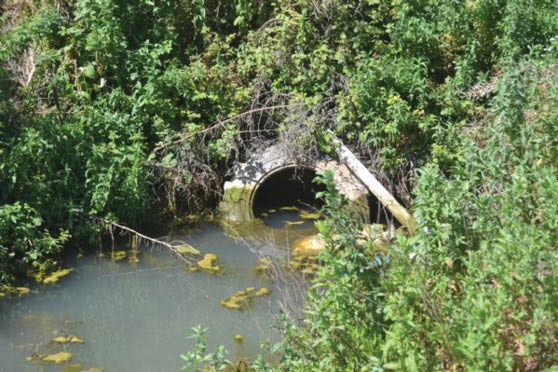
Water pollution near Salfit in the central West Bank. 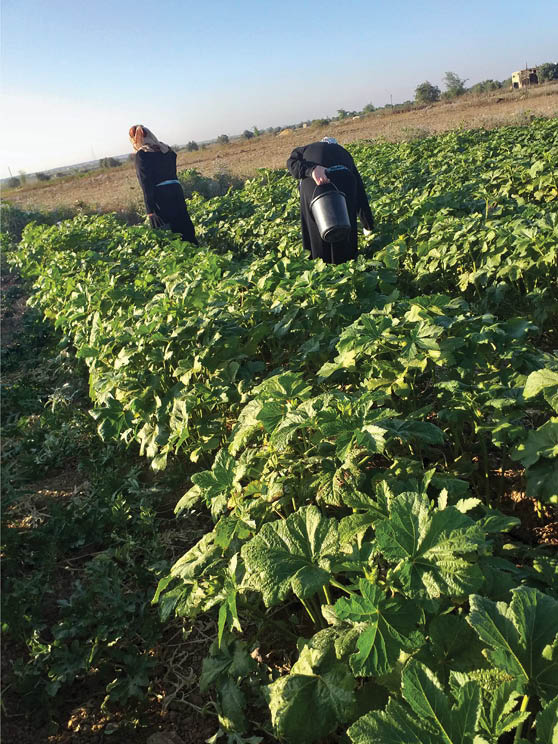
Women farmers in Gaza. 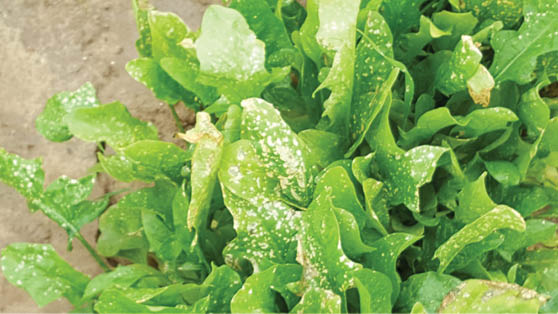
Vegetables destroyed by chemical spraying in Gaza.
Another issue of concern is the taking control of Palestinian water resources by Israeli settlers – condoned and supported by Israeli authorities – that results in limited access to water in most Palestinian communities and causes water pollution in large parts of the occupied Palestinian territories. Today in the Gaza Strip, the percentage of water pollution reaches 96,1 percent. As water close to wells is polluted, women must buy freshwater for drinking and cooking, which exhausts their frequently limited economic resources.
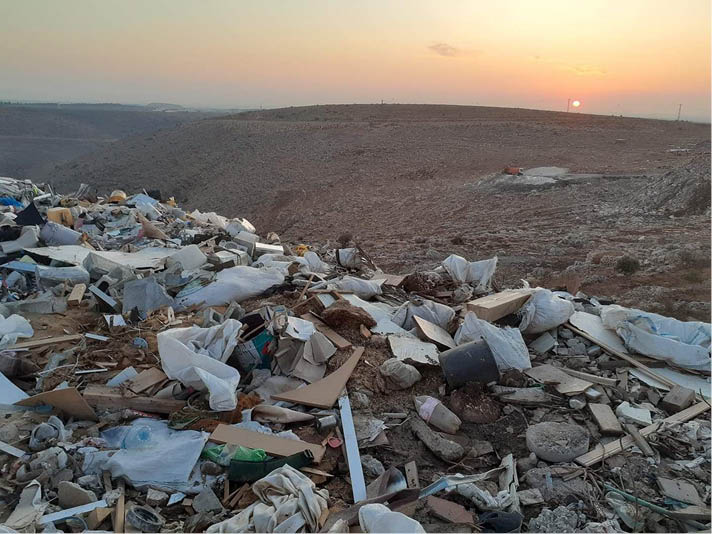
Solid waste near Deir Ballout village. 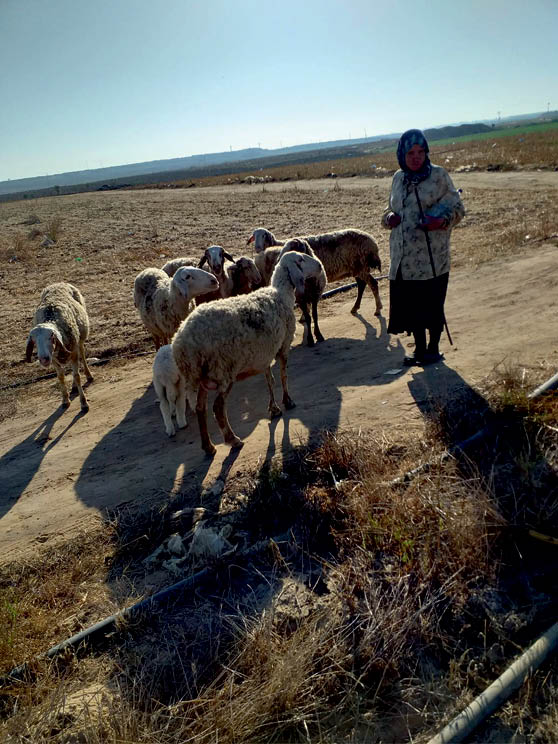
Arid land due to chemical spraying in Gaza.
One of the women affected by the Israeli occupation of water resources is Sahar, who describes herself as a young, single Palestinian woman. She lives in Bardla village, located near the Jordanian border, with her family that consists of 22 persons. She tells that the Israeli occupation forces have taken over the well that supports her whole village with water, reducing the village’s share of water to less than a quarter. Sahar’s life has changed as a result. She explains: “We [the women in the village] have been required to work as long as possible to be able to buy enough water since the occupation authorities stole the water well. The water reaches the village from the well only one day a week, and that is simply not enough.” Sahar now works 13 hours a day and volunteers with a feminist association through which the women of the village have implemented a fair system of water distribution according to the needs of the individual families, hereby securing the optimum use of the scarce water resources. Additionally, the families are now sharing the livestock they have left in the village – after they were forced to sell much of it as they were no longer able to provide it with enough drinking water – thus distributing the burden of water payment among more families.
Israel has taken over the water resources of Bardla village, and the consequences have been overwhelming, especially from a gendered perspective.
The gendered impact of access to water is also illustrated by data, gathered by WCLAC, that examine the consequences of women’s long-term exposure to polluted water. According to the collected testimonies and other research, there is a correlation between exposure to contaminated water and chronic diseases such as kidney failure. In order to receive medical treatment, women must visit the hospital multiple times per week, a process which is not only costly but also restricts women’s opportunities to work. Some women need to be accompanied to these medical visits, often by women and girls of the family, which in turn can limit the access to work or education of these women and girls.
“The problem of water shortage affects women more. They suffer more than men because women are responsible for cleaning the house, for planting, and for caring for the livestock.”
Sahar, a young Palestinian woman.
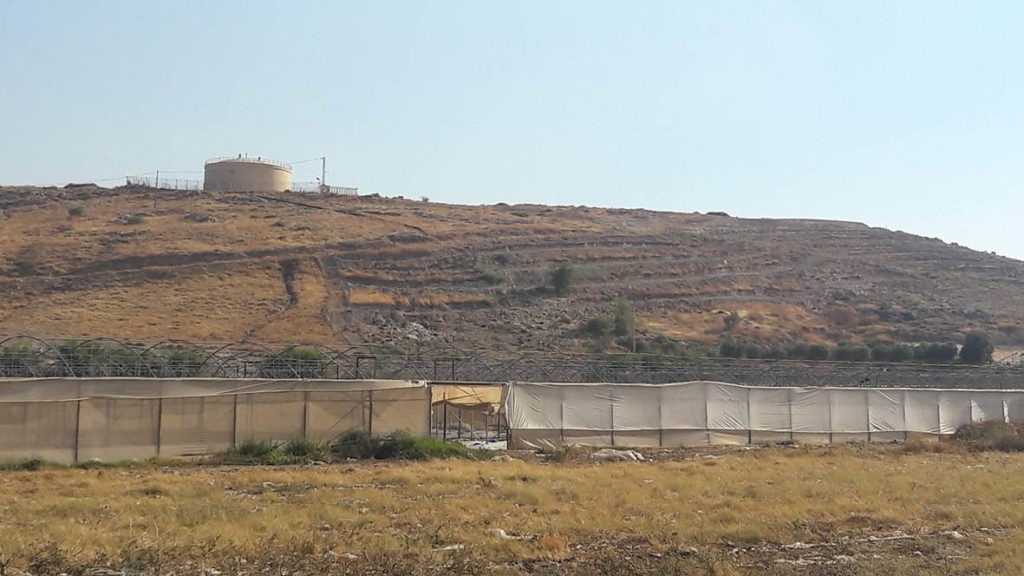
Some of the Palestinian women interviewed by WCLAC explained that they know that the water in the nearby wells is contaminated by wastewater from surrounding settlements, but that they do not have any other solution and no access to clean water. Women shared their feelings of distress, hopelessness, and exhaustion as they are forced to knowingly expose themselves and their families to disease by drinking polluted water that both looks and smells bad because they have no other options. They feel troubled as well because they must use contaminated water for meal preparation, the tending to their livestock, and in agriculture. Water shortage, moreover, has forced women to sell their livestock in order to reduce water consumption, as was the case for Sahar and her village.
Not only Palestinian women are particularly affected by water and soil pollution and exposed to diseases and infections associated with chemical spraying. This also affects the women’s children who tend to accompany their mothers to the fields and hence risk becoming infected with disease both acutely and in the long term.
Israel is a signatory to the Basel Convention on the Control of Transboundary Movements of Hazardous Waste and their Disposal which stipulates that each party shall take appropriate measures to “ensure the availability of adequate disposal facilities, for the environmentally sound management of hazardous wastes and other wastes, that shall be located, to the extent possible, within it, whatever the place of their disposal.”*2 However, more than 50 Palestinian locations are used as dumping sites by Israel and expose the territories to waste-related hazard. Israel is also a signatory to the Stockholm Convention on Persistent Organic Pollutants, the main objective of which is to “protect human health and the environment from persistent organic pollutants.’’ Israel is acting in direct opposition to both these conventions, purposely polluting Palestinian soil, water, and air.
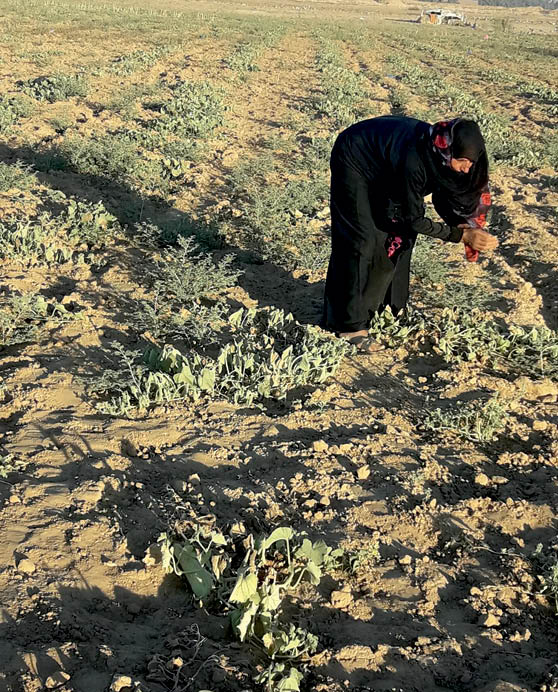
WCLAC encourages the Israeli occupation forces to immediately stop the illegal dumping of hazardous waste in the occupied Palestinian territories and to end practices that infringe on Palestinians’ access to their natural resources, ensuring instead equitable access to clean water. This access is both, a fundamental human right in itself and an integral component of the realization of a range of other human rights. Furthermore, WCLAC recommends an assessment of the impact of carried out by Israel at unannounced occasions, particularly affecting Palestinian women and children, and to enact safety measures to ensure the adequate protection of pregnant women, children, and other groups that are particularly susceptible to chemical spraying exposure. Lastly, WCLAC underlines the centrality of the right to self-determination that will be limited and restricted as long as Palestinians, including Palestinian women, live under occupation. The lack of self-determination in the occupied Palestinian territory forms the basis of, strengthens, and magnifies violations of human rights by Israel as an occupying power.
Article photos courtesy of WCLAC.
*1 OCHA, “The humanitarian impact of restrictions on access to land near the perimeter fence in the Gaza Strip”, 3 August 2018, available at https://www.ochaopt.org/content/humanitarian-impact-restrictions-access-land-near-perimeter-fence-gaza-strip
*2 The Basel convention on the Control of Transboundary Movements of Hazardous Waste and their Disposal, 1989-03-22, article 4 para 2. (b).


